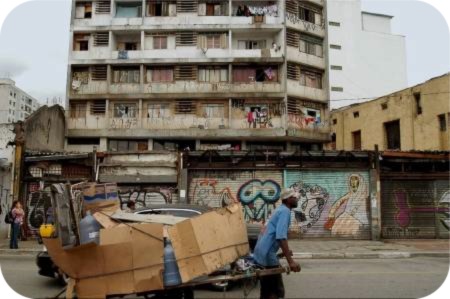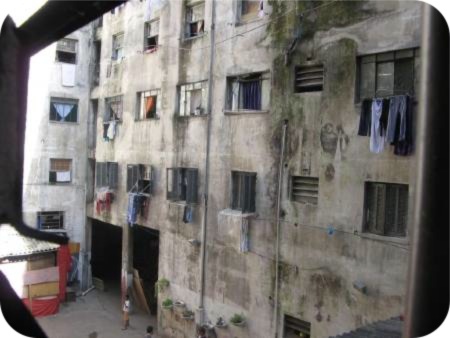In the last two editions of Middlesbrough Catholic Voice, CAFOD has focussed on its Connect2 project which gives parishes here in England and Wales the opportunity to journey alongside our partners in either El Salvador, Ethiopia, Rwanda, Bangladesh, Cambodia or Brazil. Sarah Smith-Pearse, CAFOD’s Communications Officer for Latin America and the Caribbean, tells us about her recent visit to Brazil.
Recently I flew in to São Paulo, Brazil. Tired, grubby and keen for a shower, I found a taxi and travelled to a hotel in Higienopolis, a rather smart part of town, where Poodles, Yorkshire terriers and Chihuahuas can be seen going for an evening stroll, dressed in fetching jackets and parading round the block with their devoted owners. I couldn’t help but be surprised and shocked at finding this large population of glamorous canines in a city where two million people live in slums. Brazil is one of the most unequal economies in the world, where the wealthy few can afford to dress their dogs in fancy coats, but where many millions struggle to pay for the basics of food and shelter. As I walked down the street, I passed someone, shrouded in a blanket and lying on the pavement. Statistically, I could explain to you that ‘he’ or ‘she’ was one of 15,000 people who sleep rough every night in São Paulo. But beneath the blanket lay a person with a name and a life story – or, as they say in liberation theology, the figure of Jesus incarnate in the lives of the poor.

The purpose of my visit to São Paulo was to meet people in two communities, Mauá and Divineiá, who are taking part in a new CAFOD initiative called Connect2 Brazil. Mauá is a community of 220 homeless families who have taken shelter in an abandoned hotel about 15 minutes walk from Higienopolis. Divineiá is a shanty town in the east of São Paulo that has grown up over the last 30 years as a home to hundreds of rural migrants. Both communities are supported by CAFOD through an urban community development programme that encompasses the work of three partner organisations, APOIO (the Mutual Support Association for Homeless People), MDF (the Movement for the Defence of Shanty Town Dwellers) and CCJ (the Centre for Youth Training). Together, these organisations are striving to improve the housing conditions of millions of poor people, by lobbying the São Paulo city government to invest more public funds in the provision of affordable and good quality homes, together with the necessary public services.

Connect2 Brazil is a new initiative that offers parishes in England and Wales the opportunity to follow the lives of people in two communities, Mauá and Divineiá , over a period of several years. This is a chance for you to learn more about the situation of homeless and vulnerable groups in São Paulo through the eyes of nine community leaders, Nete, Raquel, William and Nelson, who live in Mauá, and Argentina, Teresa, Zeza, Maria and Maristely, who live in Divineiá. They in turn hope to learn more about parishes in England and Wales and build a more personal connection with groups across the other side of the world who share their values and community spirit. Many of the people whom you will get to know in Mauá and Divineiá have lived through the hardship and anguish of homelessness first hand and it is this experience that motivates them to work for affordable and decent housing for others. Nete was forced to sleep on the street, under a viaduct, when she and her husband lost their jobs. Zeza’s home was destroyed in a flood and Raquel’s wooden shack collapsed after a fire. Today, they each play a vital and selfless role for the betterment of their communities.
When I visited Mauá and Divineiá, I showed people the CAFOD Connect2 Brazil information packs. I wanted to know how they felt about the way we had portrayed their lives, based on interviews they had given some months earlier. Were they happy with what we had written? Were we representing their stories accurately? Nelson read his story carefully and slowly then nodded his head, beamed broadly and said ‘It’s good!’ Nete, who was sitting beside Nelson, remarked about the importance for them of hearing each other’s stories and bearing witness to their life experience.
I also shared some messages and photographs sent by parishes already participating in Connect2 Brazil. Students from the Catholic Chaplaincy of Bangor University sent a photo of their hands joined in unison, wearing Brazilian solidarity rings and, around the picture, they wrote the words ‘friendship’, ‘community spirit’, ‘shared hope’, ‘love’ and ‘justice’. For me, the experience of visiting São Paulo over these last few weeks has been uplifting and enriching. Through Connect2 Brazil, we will have that chance to continue this relationship and to journey with them along the next chapter of their life stories.
Brazil is one of six focus countries in the Connect2 initiative, the others being Bangladesh, Cambodia, El Salvador, Ethiopia and Rwanda. Why not sign your parish up to one of our partners now?
